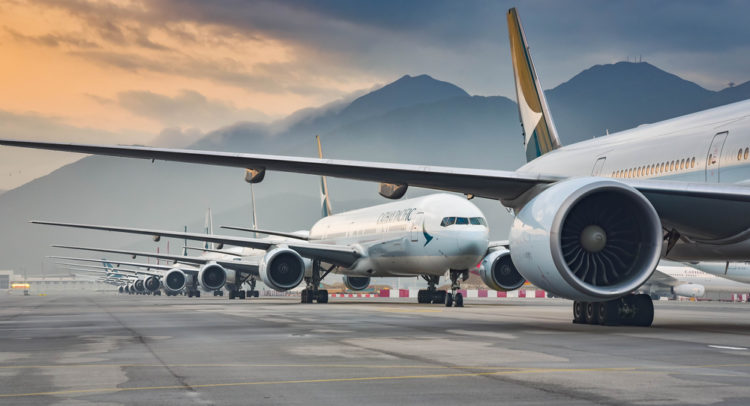Airline companies have always been susceptible to exogenous factors like the coronavirus pandemic. While the pandemic grounded flights and sapped travel demand, strict advisories, including negative COVID-19 test results, the mandatory wearing of masks, and the maintenance of social distance protocols discouraged freedom of mobility.
Discover the Best Stocks and Maximize Your Portfolio:
- See what stocks are receiving strong buy ratings from top-rated analysts.
- Filter, analyze, and streamline your search for investment opportunities with TipRanks’ Stock Screener.
Now, with a continued decline in COVID-19 cases and the easing of restrictions, air travel demand is gaining steam. Further, a federal judge in Florida recently overturned the CDC’s (Centers for Disease Control and Prevention) mask mandate on public transport, including flights. Following the ruling, the TSA (Transportation Security Administration) said that it would no longer enforce the mask mandate.
Several commercial airline companies, including Delta Air Lines (NYSE:DAL) and United Airlines (NASDAQ:UAL), quickly announced that masks are optional.
The easing of travel restrictions is undoubtedly a positive development for airline companies. However, the impact of making masks optional on travel demand is hard to tell. Nevertheless, market participants cheered the development, with shares of major airline companies closing in the green.
As things gradually improve for the airline sector, operating expenses for airline companies could increase due to higher fuel prices. Further, air travel is getting costlier as companies pass on the costs to customers.
Highlighting the impact of higher fuel prices, Deutsche Bank analyst Michael Linenberg expects the June quarter results of airline companies “to be impacted by rising fuel prices and labor shortages.”
For the June quarter, Linenberg widened the industry forecast for revenue. The analyst added that a higher top-line forecast indicates “that the industry has recovered to 94% of 2019 revenue.” However, Linenberg lowered his estimate to a pre-tax loss of $330 million compared to his earlier estimate of a pre-tax profit of $2.2 billion. The analyst blamed the higher fuel bill as the culprit.
Nevertheless, Linenberg expects Alaska Air (NYSE:ALK) and Southwest Airlines (NYSE:LUV) to “face less of an impact from higher fuel prices given their formidable fuel hedge positions.”
Further, highlighting Delta’s Monroe Energy refinery, Linenberg stated that it “produces enough refined product (i.e., 185,000 barrels per day) to cover a good portion of the “crack spread” for ~90% of Delta’s consumption after incorporating supply and offtake agreements with other refiners.”
With multiple variables impacting the performance of airline companies, investing in them becomes tough. Against this backdrop, we’ve used TipRanks’ data-driven Smart Score to select stocks with a higher chance of outperforming the broader market averages.
Delta Airlines
Delta Airlines impressed investors with its latest financial performance. Though the company delivered an adjusted loss of $793 million, an improving demand environment and the recovery in business and international travel was the primary sticking point.
Further, the company’s President, Glen Hauenstein, added, “In the June quarter, we are successfully recapturing higher fuel prices and expect our revenue recovery to accelerate to 93 to 97 percent with unit revenue up double digits compared to 2019.”
Delta stock has received 13 Buy and two Hold recommendations for a Strong Buy consensus rating on TipRanks. Further, the average price target of $49.92 indicates 16% upside potential over the next 12 months. Another positive signal comes from investors holding portfolios of TipRanks. Per the data, about 3.3% of these investors have accumulated DAL stock in the last 30 days. Overall, DAL stock has an Outperform Smart Score of 8 out of 10.

Alaska Air
Alaska Air’s focus on adding depth to its network and bringing capacity back to pre-pandemic levels are encouraging. Linenberg is bullish on ALK stock with a price target of $75 (28.7% upside potential), representing “a ~5x EV/EBITDAR multiple” on his 2023 EBITDAR estimate. Including Linenberg, ALK stock has eight unanimous Buy recommendations. Further, the average price target of $76.88 indicates 31.9% upside potential over the next 12 months.
TipRanks’ stock investor tool shows that 5.1% of investors have added ALK shares in the last 30 days. Overall, ALK stock has an Outperform Smart Score of 9 out of 10.

Bottom Line
The recovery in demand, easing travel restrictions, and increasing capacity are likely to support the financials of airline companies. However, the uncertainty related to the coronavirus and higher fuel costs amid the Russia/Ukraine crisis could remain a drag in the short term.
Discover new investment ideas with data you can trust.
Read full Disclaimer & Disclosure









